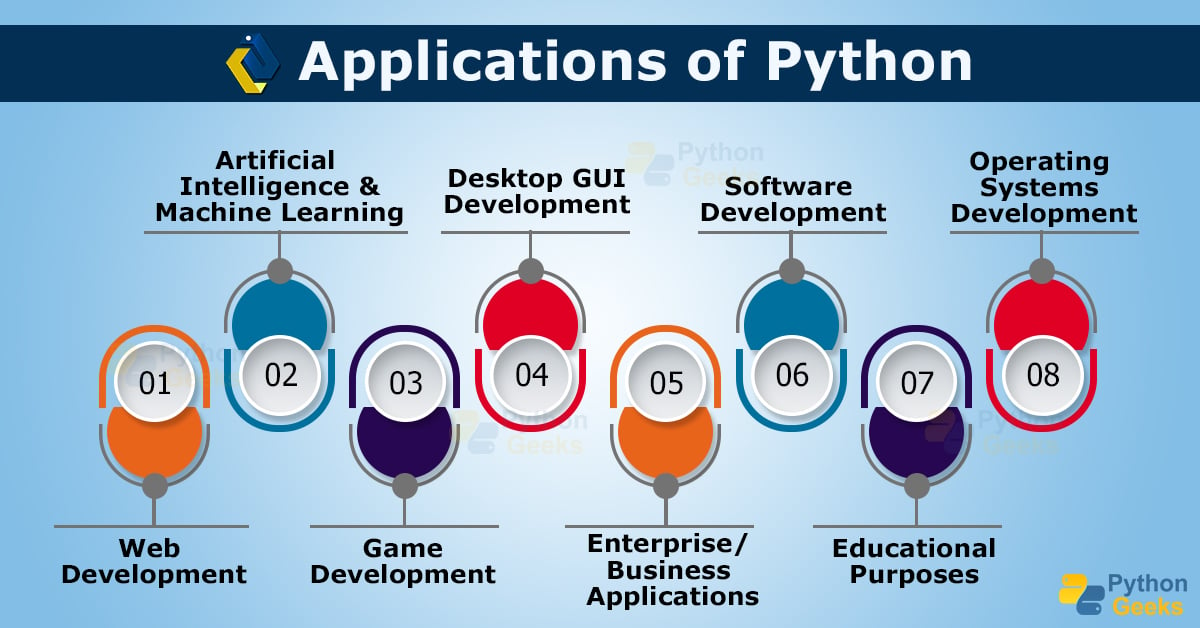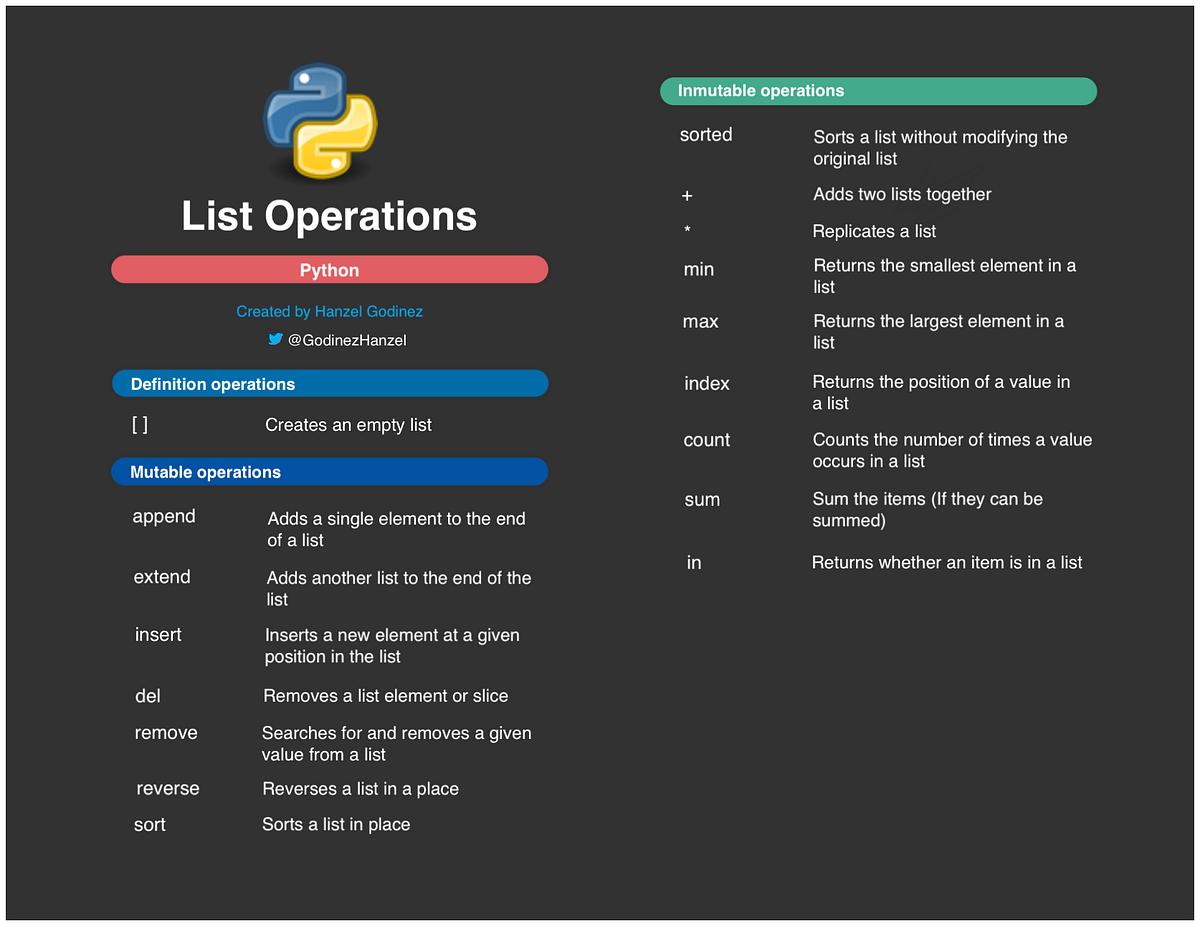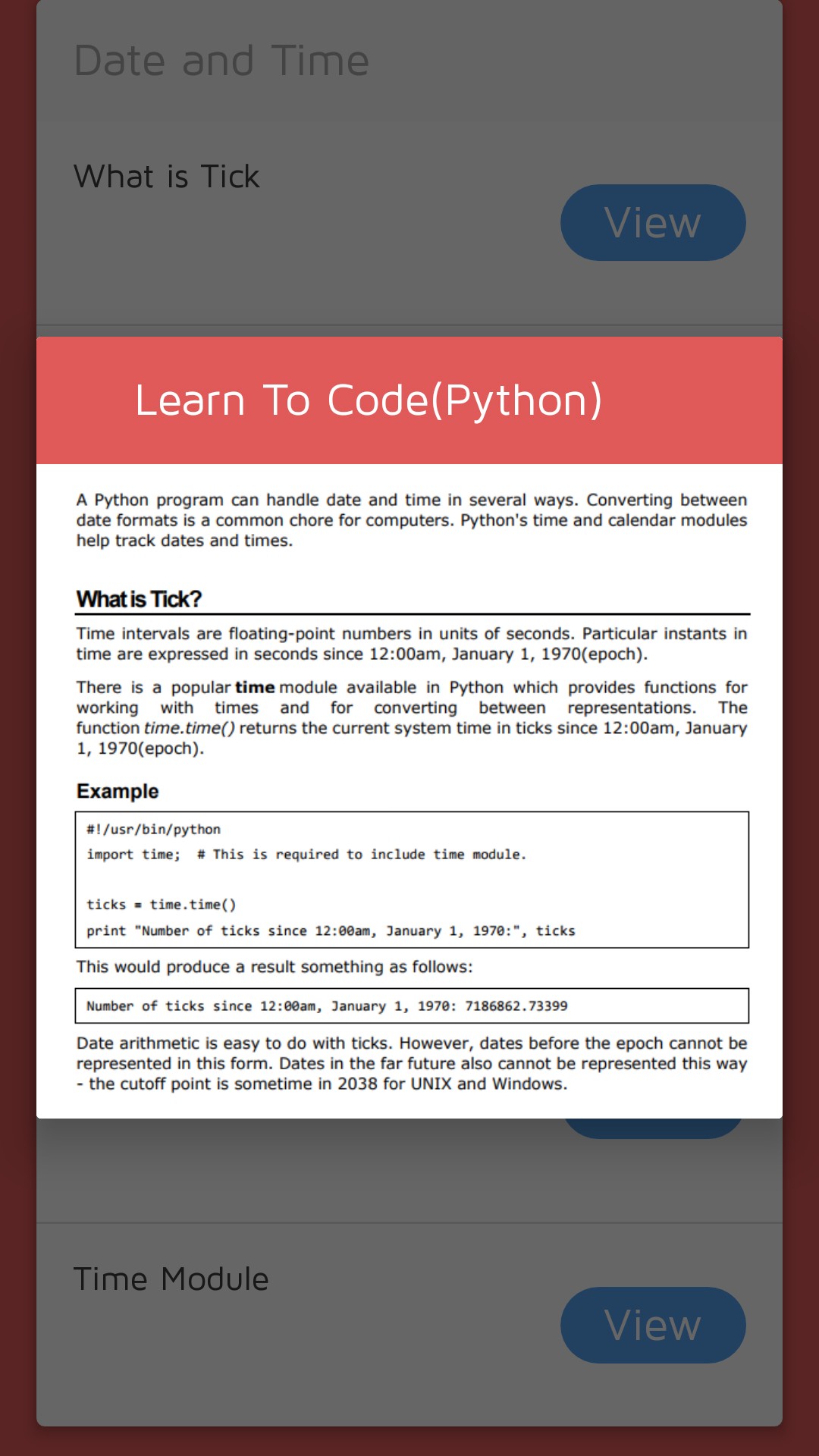If we apply the method items() to a dictionary, we don't get a list back, as it used to be the case in Python 2, but a so-called items view. The items view can be turned into a list by applying the list function. Even though this list of 2-tuples has the same entropy, i.e. the information content is the same, the efficiency of both approaches is completely different. In PHP, all arrays can be associative, except that the keys are limited to integers and strings. In JavaScript , all objects behave as associative arrays with string-valued keys, while the Map and WeakMap types take arbitrary objects as keys. In Lua, they are used as the primitive building block for all data structures.
The D language also has support for associative arrays. Python dictionary is a container of key-value pairs. Python dictionaries are called associative arrays or hash tables in other languages. The keys in a dictionary must be immutable objects like strings or numbers. We can convert a dictionary into a list of tuples using the items method.
The first line below will create a dict_items object, which is iterable, so we can loop over the key-value pairs in this object. However, this object is not indexable – i.e. trying to run mapper.items() will result in an error. However, if we wanted to reference key-value pairs by index, we can convert this to a list. In practice, we usually would not need to do this conversion.
A for loop on a dictionary iterates over its keys by default. The methods dict.keys() and dict.values() return lists of the keys or values explicitly. There's also an items() which returns a list of tuples, which is the most efficient way to examine all the key value data in the dictionary. All of these lists can be passed to the sorted() function. Many programs using associative arrays will at some point need to store that data in a more permanent form, like in a computer file.
This is most commonly implemented in the underlying object model, like .Net or Cocoa, which include standard functions that convert the internal data into text form. Reflection is required to maintain the same semantics as found in regular Python code. However, the reflection process can be expensive for large lists and it is not supported for lists that contain reflected data types. Users cannot use list-of-list as an argument because of this limitation. Lists can be used as stacks and the operator pop() is used to take an element from the stack.
So far, so good for lists, but does it make sense to have a pop() method for dictionaries? After all, a dict is not a sequence data type, i.e. there is no ordering and no indexing. Therefore, pop() is defined differently with dictionaries. Keys and values are implemented in an arbitrary order, which is not random, but depends on the implementation. If D is a dictionary, then D.pop removes the key k with its value from the dictionary D and returns the corresponding value as the return value, i.e.
Built-in syntactic support for associative arrays was introduced in 1969 by SNOBOL4, under the name "table". TMG offered tables with string keys and integer values. MUMPS made multi-dimensional associative arrays, optionally persistent, its key data structure. SETL supported them as one possible implementation of sets and maps. In many more languages, they are available as library functions without special syntax.
Thekeys method returns a list of keys from a dictionary. And theitems method returns a list of key-value tuples. Interface and is usable in both interpreted Python code and JIT-compiled Numba functions. Because the typed dictionary stores keys and values in Numba's native, unboxed data layout, passing a Numba dictionary into nopython mode has very low overhead. The message body is used to pass the data instead of parameters in the query string. These data are passed by the POST, PUT and the less common patch.
The data can be a dictionary, a list of tuple, bytes, or a file-like object. Using requests, you will pass the payload to the corresponding function's data parameter. Inside the totalBrought() function, the for loop iterates over the key-value pairs in guests ❶. If it does not exist as a key, the get() method returns 0 to be added to numBrought. Requests is an popular, simple yet powerful HTTP library for Python. It allows you to easily prepare and send complex HTTP requests in a few lines of code.
Using the keys(), values(), and items() methods, a for loop can iterate over the keys, values, or key-value pairs in a dictionary, respectively. Notice that the values in the dict_items value returned by the items() method are tuples of the key and value. Similar to list comprehensions, we can also create dictionaries using dictionary comprehensions. We can do that using the items method we just covered.
But what's the difference between lists and dictionaries? A list is an ordered sequence of objects, whereas dictionaries are unordered sets. However, the main difference is that items in dictionaries are accessed via keys and not via their position. In the above method, the url argument is the URL of the particular website where the user sends the request. The param argument is used to send a query string in the dictionary and the args is one of the multiple named arguments.
You can send more than one file in a single POST with requests library as well. It's a little different than when you send a single file. In this case, the files dictionary should be a list of 2-element tuples following syntax, where file_info should be a 3-element tuple that contains file details. If you want to emulate a request sent by a HTML form, which contains form-encoded data, you can pass the data argument just like the example above.
The data argument can also take in a tuple-based payload or a dictionary-based one with multiple elements in the same key. Compared to hash tables, these structures have both advantages and weaknesses. The worst-case performance of self-balancing binary search trees is significantly better than that of a hash table, with a time complexity in big O notation of O. This is in contrast to hash tables, whose worst-case performance involves all elements sharing a single bucket, resulting in O time complexity.
In addition, and like all binary search trees, self-balancing binary search trees keep their elements in order. Thus, traversing its elements follows a least-to-greatest pattern, whereas traversing a hash table can result in elements being in seemingly random order. Many programming languages include associative arrays as primitive data types, and they are available in software libraries for many others. Content-addressable memory is a form of direct hardware-level support for associative arrays. In mathematical terms an associative array is a function with finite domain.
It supports 'lookup', 'remove', and 'insert' operations. When called, this method returns an iterable object. The iterable object has key-value pairs for the dictionary, as tuples in a list. This method is primarily used when you want to iterate through a dictionary.
Dictionaries are like lists, but the elements of dictionaries are accessed in a different way than for lists. The elements of dictionaries are accessed by "keys", which can be either strings or integers . However, we do not make much use of them in this introduction to scientific Python, so our discussion of them is limited.
Previously I discussed that the Content-Type header will automatically be set to application/json when passing data to json. We can set headers manually is a very similar way to how we have been sending data. Once again, create the header key-value pairs in a Python dictionary and then pass them to the headers parameter.
The Python list stores a collection of objects in an ordered sequence. In contrast, the dictionary stores objects in an unordered collection. However, dictionaries allow a program to access any member of the collection using a key – which can be a human-readable string. There are times that you may want to send a JSON as string to a server via a POST request.
For example, a few API only accepts complex data to be able to simplify the request body. If you pass in a string instead of a dict, the JSON data will be posted directly to the URL. In this example, we manually encode the JSON data to string with Python json library. However, there are instances when I just have a few lines of data or some calculations that I want to include in my analysis. In these cases it is helpful to know how to create DataFrames from standard python lists or dictionaries.
The basic process is not difficult but because there are several different options it is helpful to understand how each works. I can never remember whether I should use from_dict, from_records, from_itemsor the default DataFrameconstructor. Normally, through some trial and error, I figure it out. Since it is still confusing to me, I thought I would walk through several examples below to clarify the different approaches.
At the end of the article, I briefly show how this can be useful when generating Excel reports. Unlike lists or arrays in python, a dictionary is a non-ordered collection of entries. Each entry does not have a designated spot within the dictionary. A set of values in the dictionary is linked to its reference, not unlike how in an actual dictionary a definition is linked to a word. As mentioned earlier in this post, dictionaries can contain many types of objects. Let's create a dictionary with lists as some of its values.
¶Return a Request object with the same members, except for those members given new values by whichever keyword arguments are specified. TheRequest.cb_kwargs and Request.meta attributes are shallow copied by default . See alsoPassing additional data to callback functions.
¶A dictionary that contains arbitrary metadata for this request. Its contents will be passed to the Request's callback as keyword arguments. It is empty for new Requests, which means by default callbacks only get a Responseobject as argument.
Dictionary is a python data type that is used to store key-value pairs. It enables you to quickly retrieve, add, remove, modify, values using a key. Dictionary is very similar to what we call associative array or hash on other languages. Part of the data the client sends in a request is the request method. GET requests are normally for reading data only without making a change to something, while POST and PUT requests generally are for modifying data on the server. So for example, the Stripe API allows you to use POST requests to create a new charge so a user can purchase something from your app.
The object returned is a list of all keys in the dictionary. And just like with the items() method, the returned object can be used to reflect the changes made to the dictionary. Python comes with a variety of built-in data structures, capable of storing different types of data. A Python dictionary is one such data structure that can store data in the form of key-value pairs.
The values in a Python dictionary can be accessed using the keys. In this article, we will be discussing the Python dictionary in detail. ¶A MultiDict is a dictionary subclass customized to deal with multiple values for the same key which is for example used by the parsing functions in the wrappers. This is necessary because some HTML form elements pass multiple values for the same key. A dictionary, list of tuples or bytes to send as a query string.
As mentioned in the first guide of this series, JSON resources can be easily manipulated using lists and dictionaries. The Python standard library provides all the utilities that we will need to read files, query API endpoints through HTTP requests, and handle the JSON output. Headers, response bodies, status codes, and more are returned in the Response for each method.
Next you'll take a closer look at the POST, PUT, and PATCH methods and learn how they differ from the other request types. If the request content type is application/x--urlencoded, the data will be send in the dictionary. For programs that use very large data sets, this sort of individual file storage is not appropriate, and a database management system is required.
Some DB systems natively store associative arrays by serializing the data and then storing that serialized data and the key. Individual arrays can then be loaded or saved from the database using the key to refer to them. RDBs were used for these roles in most cases, although saving objects to a RDB can be complicated, a problem known as object-relational impedance mismatch. It is worth noting that a self-balancing binary search tree can be used to implement the buckets for a hash table that uses separate chaining.
This allows for average-case constant lookup, but assures a worst-case performance of O. In this chapter, I will cover the dictionary data type, which provides a flexible way to access and organize data. Then, combining dictionaries with your knowledge of lists from the previous chapter, you'll learn how to create a data structure to model a tic-tac-toe board.































No comments:
Post a Comment
Note: Only a member of this blog may post a comment.